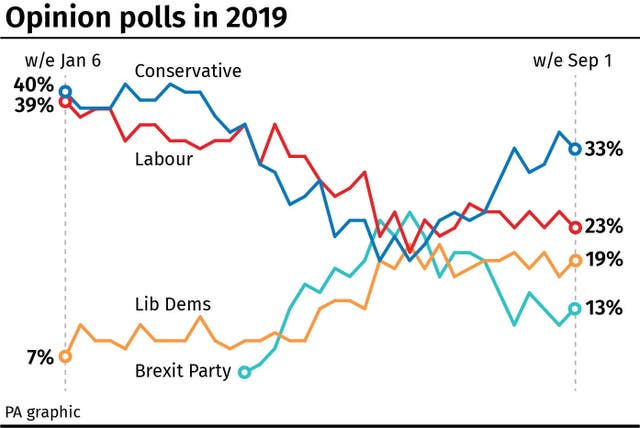The pound sunk by around 1% against the US dollar on Monday, amid fevered speculation that a general election could be called.
And while the Prime Minister did not explicitly announce a return to the polls during his address to the nation, the pound remained at historic lows, falling one cent against the dollar to 1.2069.
Even after Boris Johnson walked back through the door to 10 Downing Street following his speech, the pound did not recover and continued to trade at levels rarely seen since 1985.
David Cheetham, chief market analyst at XTB, explained: “The pound has been in a steady drift lower throughout the day and has fallen by around 1% against the US dollar to once more trade near the 1.20 dollar handle and languish not far from multi-decade lows.
“Generally speaking an election brings raised levels of uncertainty and is therefore negative near-term for the currency, but there’s also another effect at play here.”
He also suggested that there could be a recovery if an election takes place and returns a surge in support for remaining in the EU and a second referendum.
Others were less optimistic, suggesting the swings in currency fluctuations could be far more damaging longer term, as all attempts at predictions become impossible.
Sebastien Clements, a currency analyst at OFX, said: “Once again, the pound is closely resembling the behaviour of an emerging market currency, where high volatility and extreme political uncertainty leave its movements near-impossible to predict.
“Many still believe that the British economy is healthier than the strength of its currency suggests, however in the face of a global slowdown, political uncertainty continues to anchor sterling on the downside.”

The latest manufacturing stats also helped push the pound lower, as the well-regarded PMI data showed new orders in the sector were at seven-year lows and heading for a recession, based on the figures.
David Madden, market analyst at CMC Markets UK, said: “The Brexit uncertainty is bad enough, and now there is election uncertainty.
“Opinion polls put The Conservative Party in the lead, but traders still remember the 2017 election when Theresa May threw away her majority.”

